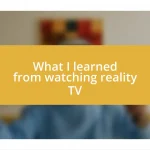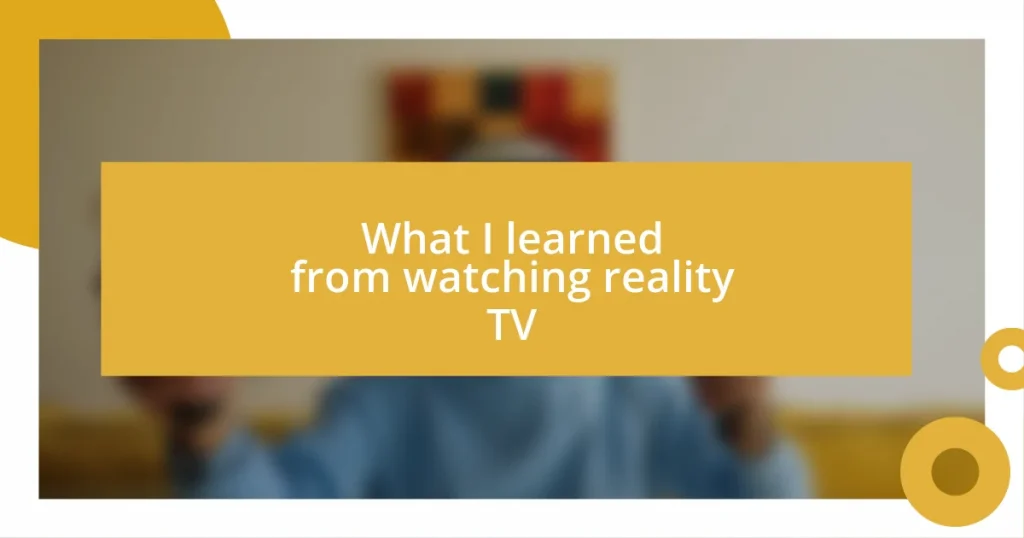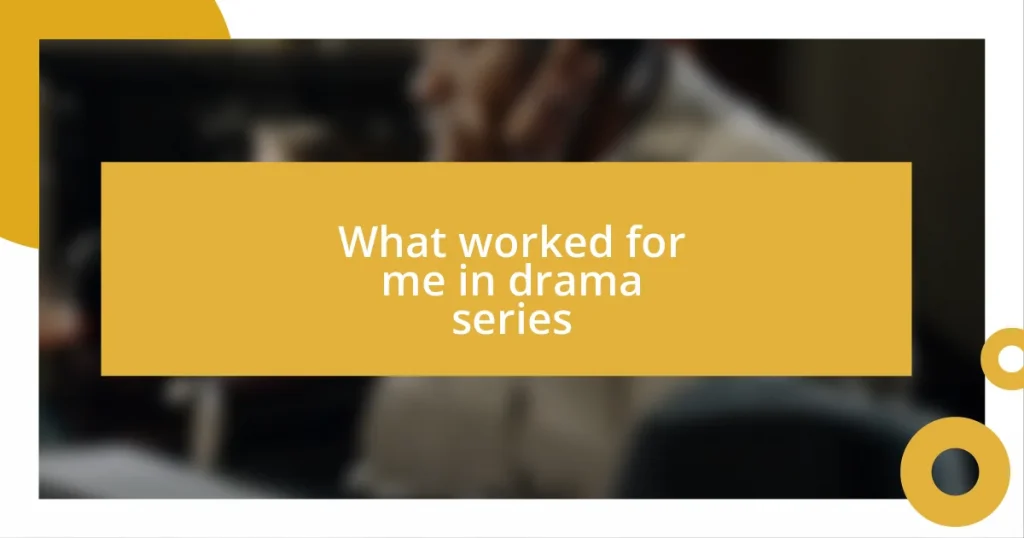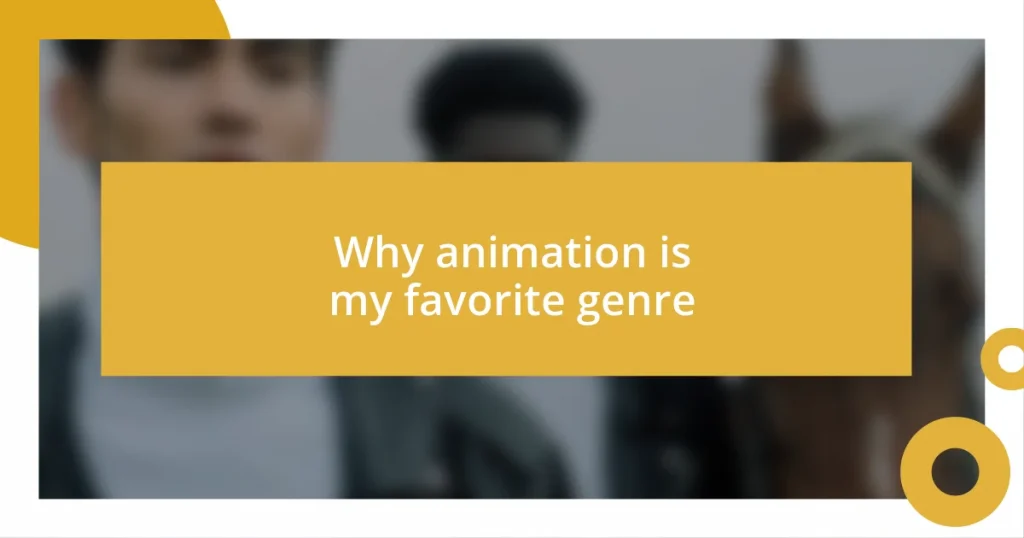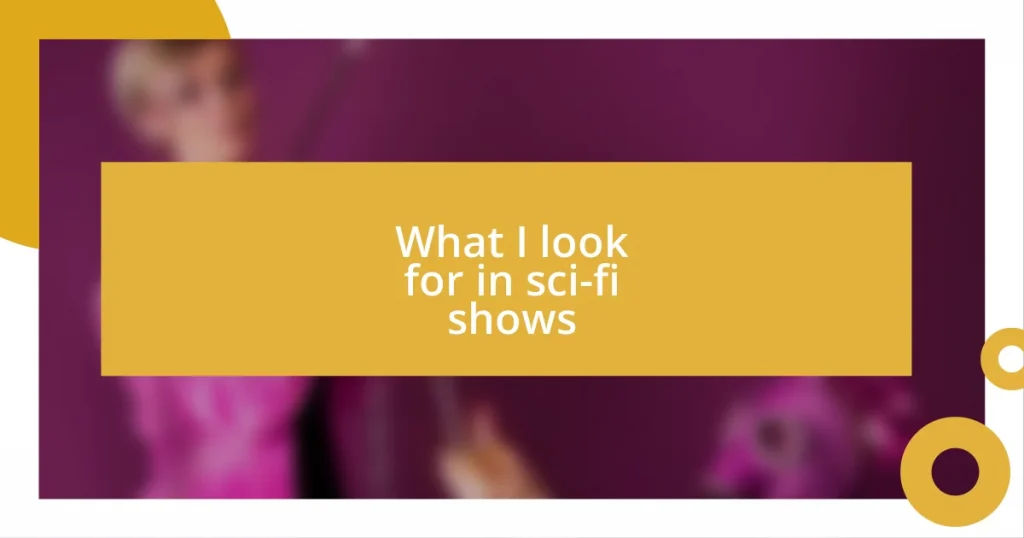Key takeaways:
- Reality TV provides relatable lessons on human behavior, resilience, and emotional intelligence, encouraging viewers to reflect on personal growth and interpersonal dynamics.
- Critical thinking skills are enhanced by analyzing contestants’ decisions, strategies, and the impact of editing on narratives, fostering a deeper understanding of real-world contexts.
- Engaging with reality TV’s authenticity promotes openness in relationships and resilience towards life’s unpredictability, challenging viewers to confront biases and embrace vulnerabilities.
Understanding reality TV’s appeal
Reality TV captivates us because it holds up a mirror to our everyday lives, showcasing both extraordinary and relatable experiences. I remember binge-watching a season of “The Real World,” feeling a deep connection with the cast’s struggles and triumphs. It made me wonder, am I the only one who sees pieces of my own life reflected in their drama and laughter?
The thrill of unpredictability is another major draw. Unlike scripted shows, reality TV unfolds in real-time, keeping viewers on their toes. I can’t help but recall the tension I felt while watching a nail-biting elimination on “Survivor.” Who doesn’t love the adrenaline rush of not knowing what will happen next?
Moreover, I believe that the social dynamics presented in these shows resonate with our innate curiosity about people and relationships. Watching contestants forge alliances or face betrayals can stir up my own memories of friendships and rivalries. Have you ever caught yourself advocating for your favorite contestant, feeling genuinely invested in their journey? It’s these emotional investments that transform reality TV from mere entertainment into a shared experience.
Key lessons from reality shows
Reality shows teach us invaluable lessons about human behavior and resilience. For instance, when I watched “America’s Next Top Model,” I was struck by how contestants handled criticism and learned to adapt. Their ability to bounce back after a harsh judgment reminded me of times when I faced my own setbacks. It reinforced the idea that setbacks can serve as springboards for growth if we approach them with the right mindset.
Here are some key lessons I’ve taken away from reality TV:
- Adaptability: Contestants often face unexpected challenges, teaching us to remain flexible in our plans.
- Emotional Intelligence: Viewing interpersonal conflicts helps develop empathy and understand different perspectives.
- Teamwork: Many shows emphasize the importance of collaboration, illustrating that success often relies on strong partnerships.
- Self-Discovery: Watching participants discover their strengths and weaknesses inspires us to reflect on our journeys.
- Conflict Resolution: The negotiations and disagreements showcase effective (and ineffective) strategies for resolving conflicts in our own lives.
These lessons resonate well beyond the screen, nudging me to reflect on my interactions and growth in day-to-day life.
Emotional intelligence through viewing
Watching reality TV has truly enhanced my emotional intelligence in ways I didn’t initially realize. During episodes filled with high-stakes emotions, such as fights or reconciliations, I noticed how I began to recognize and empathize with the cast’s feelings. Interestingly, I recall feeling my heart race during a particularly intense confrontation on “The Real Housewives.” It was in that moment I understood how powerful a simple expression or tone can be in conveying raw emotions—making me more aware of how I communicate in my own life.
I also found myself reflecting on my own relationships while observing the dynamics on these shows. For example, when contestants teamed up, I could see parallels to friendships I’ve navigated. I’ve learned to appreciate different viewpoints, even those I might not agree with. Just the other day, a friend and I were discussing a disagreement, and I remembered how a cast member had maneuvered a similar situation. That realization helped me approach the conversation with more empathy and patience, leading to a more constructive outcome.
Moreover, the emotional rollercoasters in these shows often mirror real-life experiences. I still think back to an episode of “Big Brother,” where a contestant had to decide whether to expose a secret alliance. This dilemma reminded me that sometimes, in our own decisions, we face such moral crossroad moments, and understanding the motivations behind someone’s choice can foster deeper connections. My journey through reality TV has become as much about self-discovery as it is about learning to navigate my emotions and relationships.
| Key Aspect | Reality TV Example |
|---|---|
| Emotion Recognition | Confrontations on “The Real Housewives” |
| Perspective Taking | Friend dynamics in “Big Brother” |
| Empathy Development | Conflict resolution strategies observed |
Social dynamics and group behavior
Watching the interactions on reality TV shows has given me a front-row seat to the complex web of social dynamics. Take “Survivor,” for instance. The way alliances form—and often crumble—within moments demonstrates how trust can be both a currency and a weapon in group behavior. I sometimes wonder, why do we place such value on loyalty when it’s so fluid? This ongoing push and pull reveal just how quickly relationships can change based on perceived threats or advantages.
I’ve also been fascinated by how different personalities clash and complement each other in these high-pressure environments. In “The Amazing Race,” teams must rely on each other’s strengths to succeed, which often leads to explosive arguments and heartfelt reconciliations. It reminds me of a work project where team dynamics fluctuated between conflict and collaboration. Observing these casts navigate their trials highlights the importance of communication and adaptability, which I find essential in my own life as well.
What stands out to me is the often unspoken hierarchy that emerges among contestants. In shows like “The Bachelor,” social ranking plays a significant role in group behavior, influencing decisions and shaping alliances. I can’t help but think of my own social circles—how often do we inadvertently mirror these dynamics? Recognizing the subtleties in group behavior not only enhances my understanding of others but also prompts me to reflect on my own role within various social contexts.
Developing critical thinking skills
Critical thinking is essential, and watching reality TV has surprisingly sharpened this skill for me. Whenever I see a contestant make a decision that leads to unexpected consequences, I can’t help but question their thought process. For example, in “The Bachelor,” I remember cringing when someone made a huge, emotional declaration that could backfire. It made me realize how important it is to analyze options and potential outcomes before taking bold steps in my own life.
Moreover, the dramatic twists often prompt me to think beyond what’s presented on screen. I analyze why a contestant chose to flip alliances or confront others. The strategy behind these moves mirrors real-world decision-making, where emotions and logic can clash. I recall a heated discussion among friends about a controversial contestant and how my viewpoint shifted after considering their backstory. Engaging with those differing perspectives deepened my understanding and opened up a richer conversation.
Reality TV also challenges me to evaluate the information presented, as it’s often edited for entertainment value. One moment, I might fully support a player, only to discover a shift in narrative that changes my perception. For instance, watching a contestant being portrayed as the villain made me question the editing bias. This experience has trained me to critically assess narratives in everyday life, whether in news articles or social media posts. Wouldn’t it be powerful if more people adopted this mindset? I believe the more we question the content we consume, the better equipped we are to navigate our own realities.
Applying insights in everyday life
When I think about the insights I’ve gained from reality TV, I realize how I apply them in everyday situations—especially in managing conflicts. Last week, I found myself in a disagreement with a colleague over a project direction. Reflecting on how contestants resolve their differences, I approached the conversation with an open mind, ready to listen just like I saw the cast of “Top Chef” do during their high-pressure challenges. It transformed what could have been a frustrating encounter into a productive dialogue.
I also see how reality TV has influenced my perspective on personal aspirations. Watching contestants chase their dreams, particularly in shows like “The Voice,” reminds me of my own ambitions. Their passion and vulnerability inspire me to take bolder steps in pursuing what I really want. When I’m faced with a daunting task, I often ask myself: If they can step outside their comfort zones to perform for millions, why can’t I push myself a little harder?
Finally, the importance of authenticity resonates deeply with me. I’ve learned that being genuine can significantly impact my relationships. Observing moments of raw honesty in shows like “Big Brother,” where players often reveal their vulnerabilities, has encouraged me to embrace my own truths. It raises an interesting thought: How much deeper would our connections be if we all cared less about appearing perfect and more about being real? I strive to cultivate that openness in my interactions, and the payoff has been significant—my relationships feel richer and more meaningful.
Conclusion and personal reflections
Reflecting on my experiences with reality TV, I’ve come to appreciate how the authenticity of these shows can lead to profound personal growth. I remember a time when I was struggling with being open about my feelings. Witnessing contestants lay bare their emotions really struck a chord with me. It prompted me to share my own challenges more freely with friends, revealing that vulnerability can be a strength rather than a weakness. Have you ever thought about how sharing your struggles can deepen your connections with others?
Another realization has been about the unpredictability of life, much like the plot twists in reality shows. Just last month, I faced a sudden change in my work environment. Initially, it felt overwhelming, reminiscent of a contestant being eliminated unexpectedly. Instead of panicking, I drew on what I’ve learned from watching these competitors adapt and strategize. Life throws curveballs, and navigating those with resilience often leads to better outcomes.
Lastly, I find it fascinating how reality TV challenges societal norms. Contemplating moments that spark intense reactions among viewers has led me to question my own biases. For instance, seeing a contestant break stereotypes forced me to examine my preconceptions. It’s a reminder that growth often comes from confronting uncomfortable truths. What if we all took a moment to reflect on our beliefs? Embracing this idea might just be the key to fostering understanding in our diverse world.





